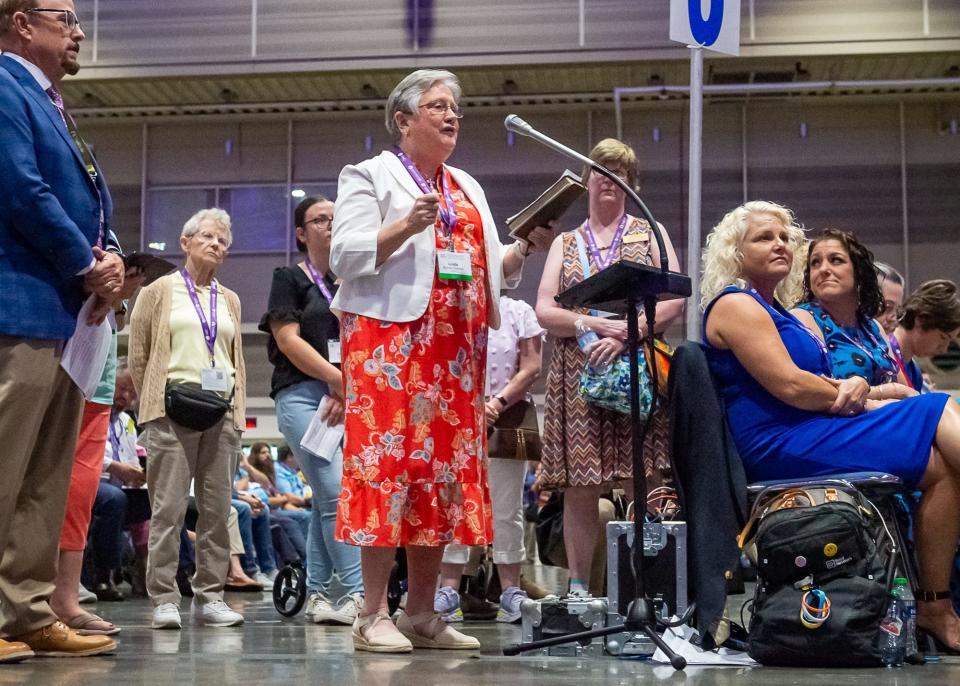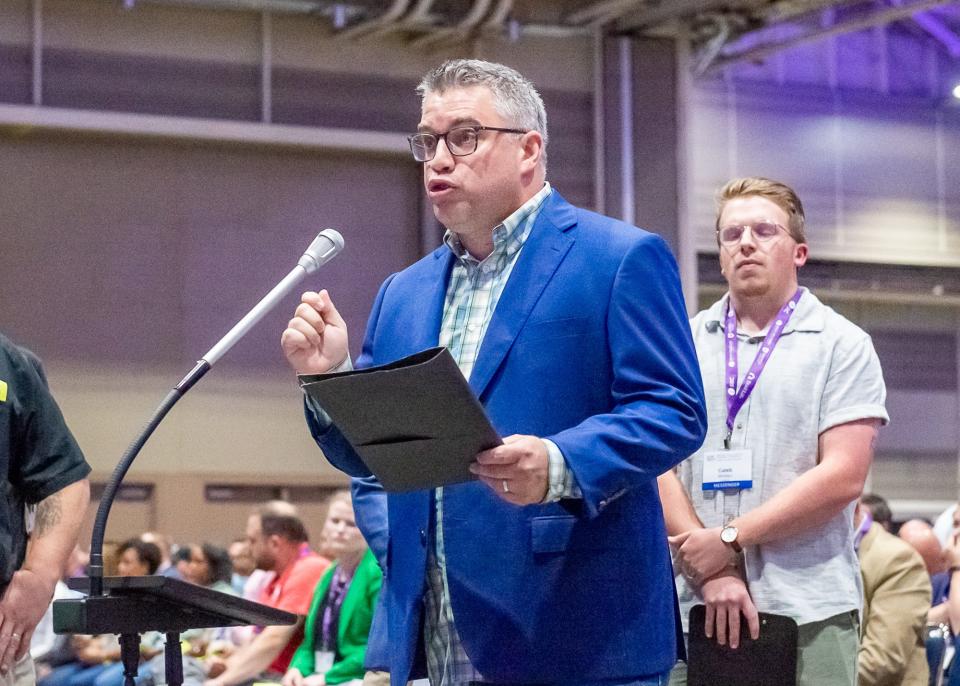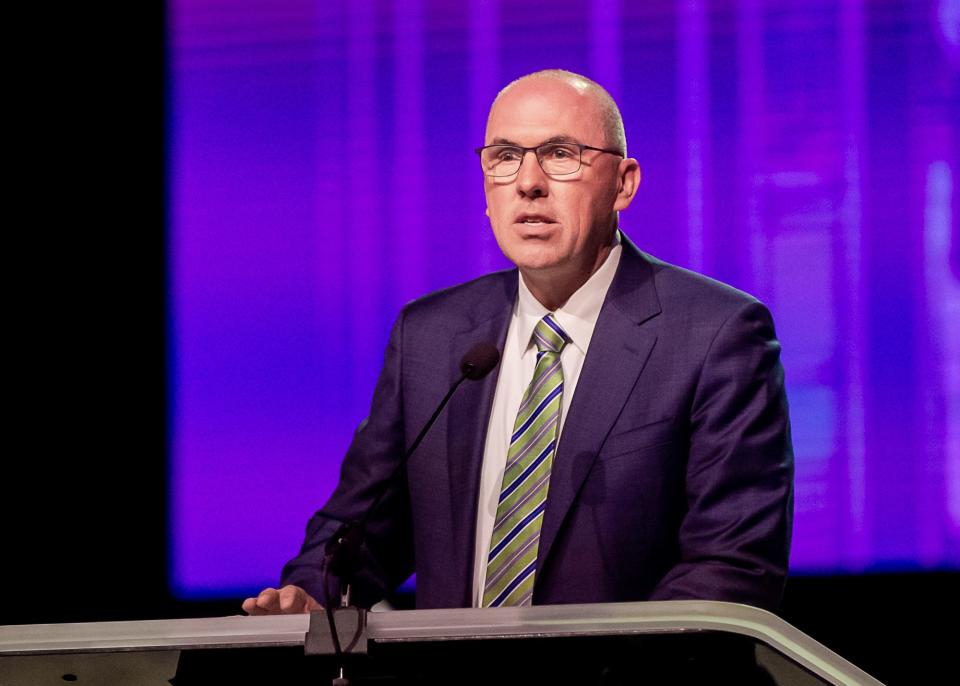How key SBC decisions on abuse, women pastors raise fundamental questions on church identity
NEW ORLEANS — Five former presidents of the Southern Baptist Convention stood formidably around a microphone.
They gathered to support a request to study the idea of “friendly cooperation” between churches and the denomination.
“It has become apparent to me we are in desperate need of two things: clarity and consistency,” said Georgia pastor James Merritt. Fellow former SBC presidents Ed Litton, J.D. Greear, Steve Gaines and Bryant Wright stood beside Merritt as he called for a new task force, a proposal that Southern Baptist voting delegates ultimately approved.
Merritt’s speech, though a less explosive moment compared to others throughout the two-day SBC annual meeting here, encapsulated a core tension for the convention.
In a series of decisions on abuse reform and the status of women pastors, Southern Baptist voting delegates, called messengers, refined what it means to be an autonomous church and still affiliate with the Nashville-based SBC, the nation's largest Protestant denomination. Some argue those decisions impede local church autonomy, while others say it’s evidence of commitment to that autonomy.
“Churches that form the majority of the Southern Baptist Convention without violating anyone else’s autonomy, as a function of their own autonomy, can decide to enforce a boundary in the Southern Baptist Convention,” SBC President Bart Barber, who won reelection for another term at this year’s annual meeting, said at a news conference Wednesday.
This year, messengers upheld the ouster of three churches over abuse-related concerns and for having women pastors, renewed ongoing abuse reform, and approved a measure that would enshrine a ban on women pastors. The latter measure requires a second approval next year.
Presidential election: Southern Baptists reelect Bart Barber as president in win for mainstream conservatives
Proponents of churches with women pastors that appealed their ousters argued the SBC was dictating certain creeds. Also, they worried that inclusion of new requirements for fellowship in the convention’s constitution will result in even more churches being excluded.
Local church autonomy is central to Southern Baptist identity. Unlike other denominations with a top-down hierarchy, the SBC believes national leaders can’t tell an individual Southern Baptist church what to do.
But Barber doesn’t believe that’s what happened this year. “Southern Baptists could no more repeal church autonomy than they could repeal gravity," he said.
Convention sends message to churches with women pastors
In multiple decisions, Southern Baptist messengers affirmed their long-standing belief that only men can be pastors. The votes indicated not only do most Southern Baptists believe that, but churches will lose their affiliation if they deviate.
That belief could become further enshrined if messengers approve the constitutional amendment again next year. It would say SBC churches must “affirm, appoint or employ only men as any kind of pastor or elder as qualified by Scripture.”
Church ousters: Southern Baptists uphold ouster of Saddleback, Fern Creek churches over women pastors
About 90% of messengers voting Tuesday agreed in a very tangible way as they upheld the ouster of Fern Creek Baptist Church in Louisville, Kentucky and Saddleback Church in Southern California for having women pastors. Up until its ouster, Saddleback was one of the SBC's largest churches.
The ouster of Fern Creek showed that while a church may be conservative, it must be conservative on gender roles to be part of the SBC.
Fern Creek pastor Linda Barnes Popham described her church as “very conservative, evangelical, mission-minded Great Commission church, like many of you.”
“We believe the Bible allows women to serve in ways you do not all agree,” she said. “But we should still be able to partner together.”

The outcome for Fern Creek and Saddleback and on the constitutional amendment, though supported by a variety of Southern Baptists, was a win for an opposition conservative faction trying to draw the denomination further to the right.
Leaders of that more conservative faction appeared at events Monday and Tuesday night. There, they yet again, stressed concerns about doctrinal “drift” in the convention, evidenced by women pastors, LGBTQ affirmation or a failure to call out those positions.
“We’re in a war,” Tom Ascol, president of Founders Ministries, said Tuesday night. “For the sake of Christ we need to be willing to stand and speak to any power, any cultural entity and say this is what the Lord says.”
Ascol, whose ministry is one of several groups that comprise the opposition conservative faction in the SBC, ran against and lost to Barber for SBC president at the 2022 SBC annual meeting. Another leader with that faction, Mike Stone, ran against Barber this year and lost.
R. Albert Mohler, president of Southern Baptist Theological Seminary, who is not a leader with the opposition conservative faction but champions some of its causes, spoke on the floor of the convention Tuesday in rebuttals to Fern Creek and Saddleback.
Articulating a position that many messengers showed agreement with, Mohler said the issue is one of “fundamental biblical authority that does violate both the doctrine and biblical order of the Southern Baptist Convention.”
Overwhelming support for abuse reform refutes autonomy argument
The SBC also displayed its ability to take a collective stance against abuse at the national level.
Messengers overwhelmingly voted to renew the SBC Abuse Reform Implementation Task Force for another year and to uphold the ouster of a church over abuse-related concerns.

The SBC has long struggled to implement necessary abuse reforms, such as a national database of ministers credibly accused of abuse, largely due to pushback in defense of church autonomy. But the decisive vote Wednesday to renew the abuse reform task force shows more Southern Baptists see a database as necessary, even if that requires adjustment.
The task force has been working on a database, called Ministry Check, this past year and presented an early version to messengers on Wednesday. However, the task force needs to complete the database according to its original design to include names of people who have received a criminal conviction or civil judgment, confessed to abuse in a non-privileged setting, and are facing allegations from an independent third-party.
Wednesday's live updates: Live updates: Southern Baptists take first step in approving ban on women pastors
Tuesday's live coverage: SBC updates: Rick Warren gives impassioned plea for Saddleback Church in SBC debate over women pastors
Critics of the abuse task force continue to raise concerns about church autonomy, which the abuse reform task force sought to respond to in a creative way. Ministry Check will not include names of churches and only individuals.
“We had people concerned their church was going to be maligned by this,” Marshall Blalock, chair of the abuse reform task force chair, said at a news conference Wednesday. “The goal was to get names on there that we could help churches say, ‘This is a person you don’t need working on your staff.’”
In time of decline, Baptists decide ‘what kind of fellowship’ to be
The SBC learned a few weeks ago it experienced another year of steep membership decline, an ongoing trend the convention is looking to counter.
The SBC’s church planting organization, Send Network, aims to help plant 22,000 new churches in the next decade, said Send Network President Vance Pittman in an interview. “In the next decade, we would love to see the kingdom of god expand by 1% in North America. Which is 2.75 million people,” Pittman said.
In some ways, the convention is opening its doors wider as it plants new churches in more racially and ethnically diverse communities. But this week, amid a time of decline, the convention also closed its doors to other churches according to certain beliefs.
“I think the messengers are saying that they want this fellowship of churches to be a fellowship of churches that do not tolerate sexual abuse,” Barber said in Wednesday’s news conference. “And also that this is a fellowship of churches that is united by a belief in biblical doctrine that includes gender roles for the office of pastor.”

This week’s decisions will play out throughout the next year. Barber will appoint the task force to study what it means to be a cooperating church, which will bring a report to the convention at the 2024 SBC annual meeting. At that 2024 meeting, messengers will vote a second and final time on the constitutional amendment.
This week was the start of a process that, Barber said, “is really about churches looking and saying, ‘What kind of fellowship of churches do we want the Southern Baptist Convention to be?’”
Katherine Burgess covers government and religion for the Memphis Commercial Appeal. She can be reached at katherine.burgess@commercialappeal.com or followed on Twitter @kathsburgess. Liam Adams covers religion for The Tennessean. Reach him at ladams@tennessean.com or on Twitter @liamsadams.
This article originally appeared on Nashville Tennessean: Southern Baptist Convention: Key decisions raise questions on church identity

